Small ship cruising offers a more personal travel experience than mega cruise liners. These intimate vessels carry 50-200 passengers, whilst large ships transport thousands. The smaller setting allows crew members to learn guests’ names and preferences quickly, typically within two days.
Small ships prioritise authentic experiences over entertainment facilities. Instead of multiple restaurants, theatres and pools, these vessels focus on meaningful cultural encounters and access to unspoilt destinations. The streamlined approach eliminates crowded buffet queues and creates opportunities for genuine local interactions.
This travel style suits people who prefer meaningful adventures over traditional cruise amenities. The experience mirrors staying at a cosy lodge rather than a busy city hotel, making it ideal for travellers seeking a more connected way to explore waterways worldwide.
Key Takeaways
- Small ships can visit places mega-ships cannot. They navigate narrow waterways and hidden harbours, giving you access to exclusive destinations.
- Small cruise ships carry fewer passengers, making it easy to meet people and form genuine friendships. You’ll enjoy personal chats with crew and fellow travellers.
- These vessels use less fuel and create less waste than large ships. Their eco-friendly systems and smaller size help protect the places they visit.
- With more crew members per passenger, you’ll get attentive service. Staff remember your name and preferences, making your journey more comfortable.
- Get closer to nature through hands-on adventures. Hop into zodiac boats for coastal exploration, watch whales from nearby, and step onto remote beaches that big ships sail past.
Alaska small ship cruises—UnCruise and Alaskan Dream pioneered intimate wilderness access decades before every destination claimed to offer ‘authentic’ experiences.
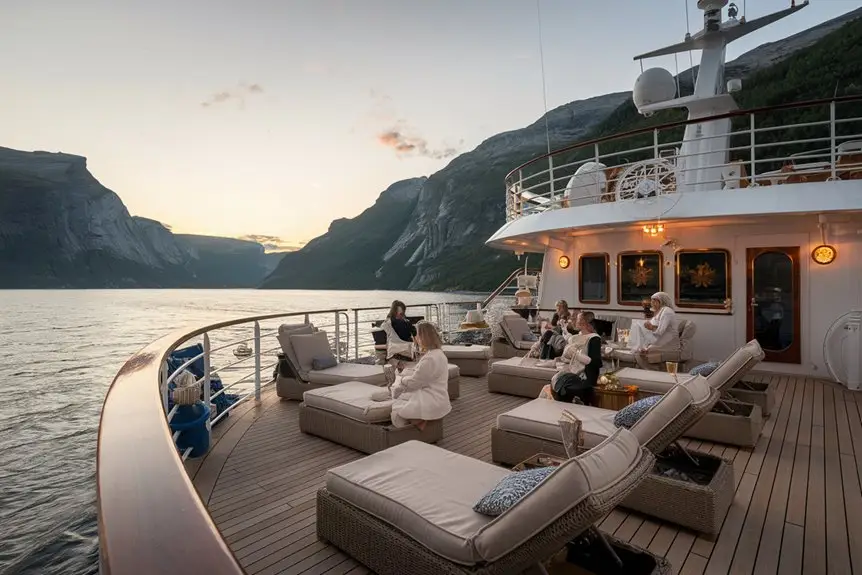
What Sets Small Ships Apart
Small ships create a friendly, neighbourhood-like atmosphere where passengers easily meet and socialise. The intimate setting lets you form genuine connections with fellow travellers in cosy shared spaces.
These compact vessels excel at three key things:
- Access to hidden spots
- Navigate narrow fjords
- Dock at small, remote ports
- Visit local communities directly
- Unique activities
- Climb to the crow’s nest
- Join small-group zodiac trips
- Participate in water sports
- Watch wildlife up close
- Environmental benefits
- Use less fuel than large ships
- Feature advanced water treatment
- Leave minimal impact on ecosystems
Small ships deliver a more personal cruising experience compared to mega-ships.
You’ll discover hidden destinations whilst enjoying closer connections with nature, wildlife and local cultures.
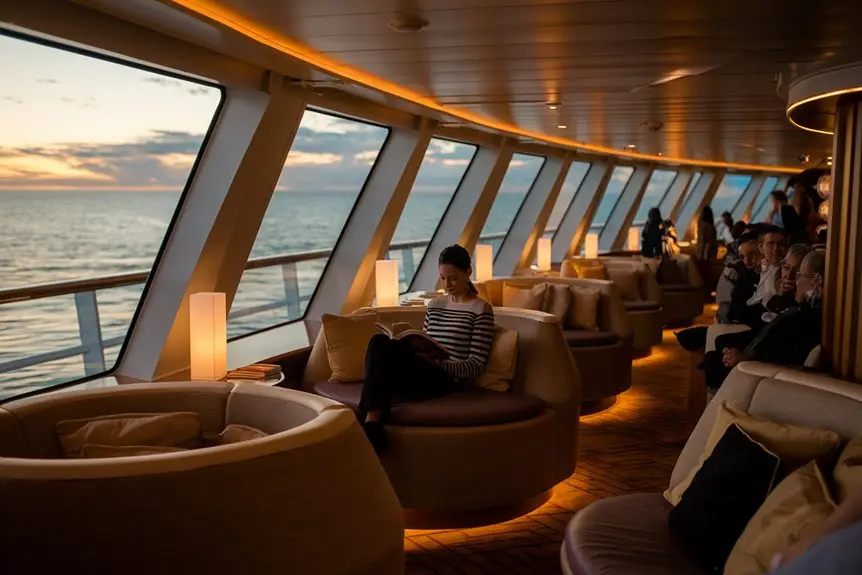
Solo Cruising Is Growing Fast
Solo cruise travellers now make up 5% of all cruise passengers – twice as many as ten years ago. Small cruise ships have adapted their services to welcome individual adventurers.
Small ships create perfect environments for meeting new people. You’ll connect naturally with other guests during meals and day trips. The high number of crew members ensures you receive personal attention throughout your journey.
Cruise companies have made practical changes to welcome solo guests by:
- Adding single-occupancy cabins
- Removing extra charges for single travellers
- Creating social spaces for easy mingling
The solo travel trend continues to grow, with research showing:
- 70% of people plan to travel alone this year
- Women lead this trend, making up 84% of solo travellers
Small ship cruising offers an ideal way to explore independently while enjoying the security and social aspects of organised travel.
You’ll find a welcoming community of like-minded travellers who share your sense of adventure.
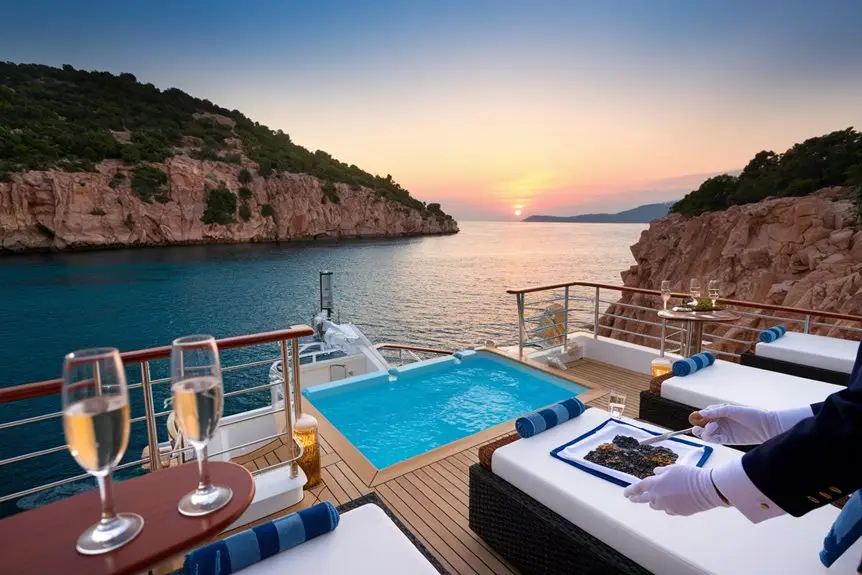
Next-Level Luxury at Sea
Small luxury cruise ships are creating new standards in high-end travel at sea. Every vessel offers exclusive balcony cabins and luxury suites that consistently reach full capacity. Ships like Seabourn Venture include unlimited premium drinks, fine wines, and fresh caviar in their packages.
These intimate vessels excel in five key areas:
- Personal service with dedicated expedition teams
- Private dining spaces for small groups
- Exclusive shore activities
- Direct access to remote harbours
- Customised guest experiences
The small-ship experience offers unique advantages:
- Private whirlpool baths with glacier views
- One-to-one learning with expert naturalists
- Personal spa suites for post-adventure relaxation
- Intimate dining with select fellow travellers
- Visits to ports beyond larger ships’ reach
Each vessel carries specialist teams of up to 24 experts and features private entertainment facilities. This combination creates a luxurious yet intimate setting for sophisticated travel.
The smaller size enables:
- Closer wildlife encounters
- More flexible itineraries
- Quicker embarkation
- Personalised service
- Enhanced dining options
This refined approach to cruising delivers luxury without compromising on adventure or comfort.
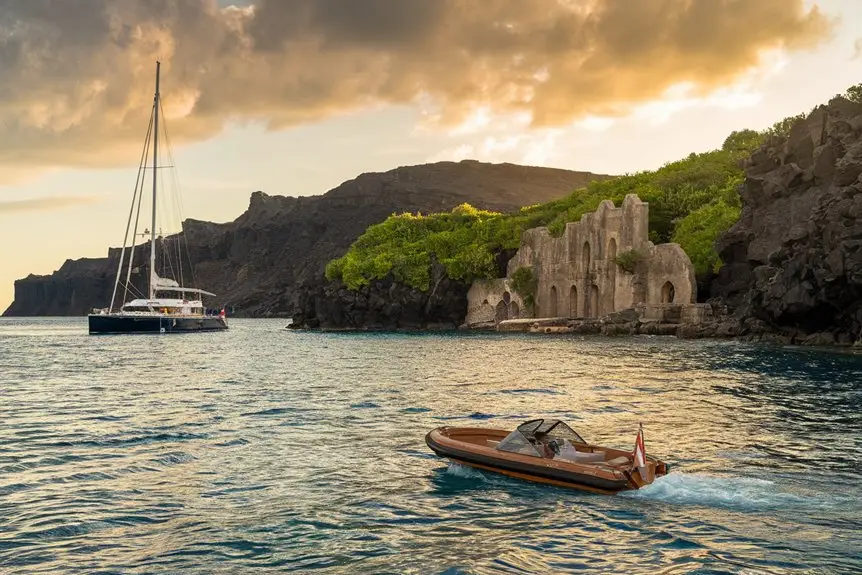
Exploring Off-Beat Destinations
Small ship expeditions are opening new paths to hidden travel destinations. Smaller vessels navigate tight waterways in the Arctic Circle and Antarctica, bringing passengers closer to wildlife.
Remote locations like the Northwest Passage and Galápagos Islands offer unique experiences that large cruise ships can’t match.
Expedition cruising has grown significantly, with passenger numbers rising 71% since 2019. These intimate ships provide limited spaces but deliver exceptional adventures.
Specialist operators like Hurtigruten and Seabourn focus on off-beat destinations, whilst European river cruises attract independent travellers seeking personal experiences.
Small vessels reach pristine environments more easily than large ships. These boats maintain luxury facilities whilst accessing remote locations that larger ships can’t reach.
Travellers need to book well in advance due to limited availability on these specialised journeys.
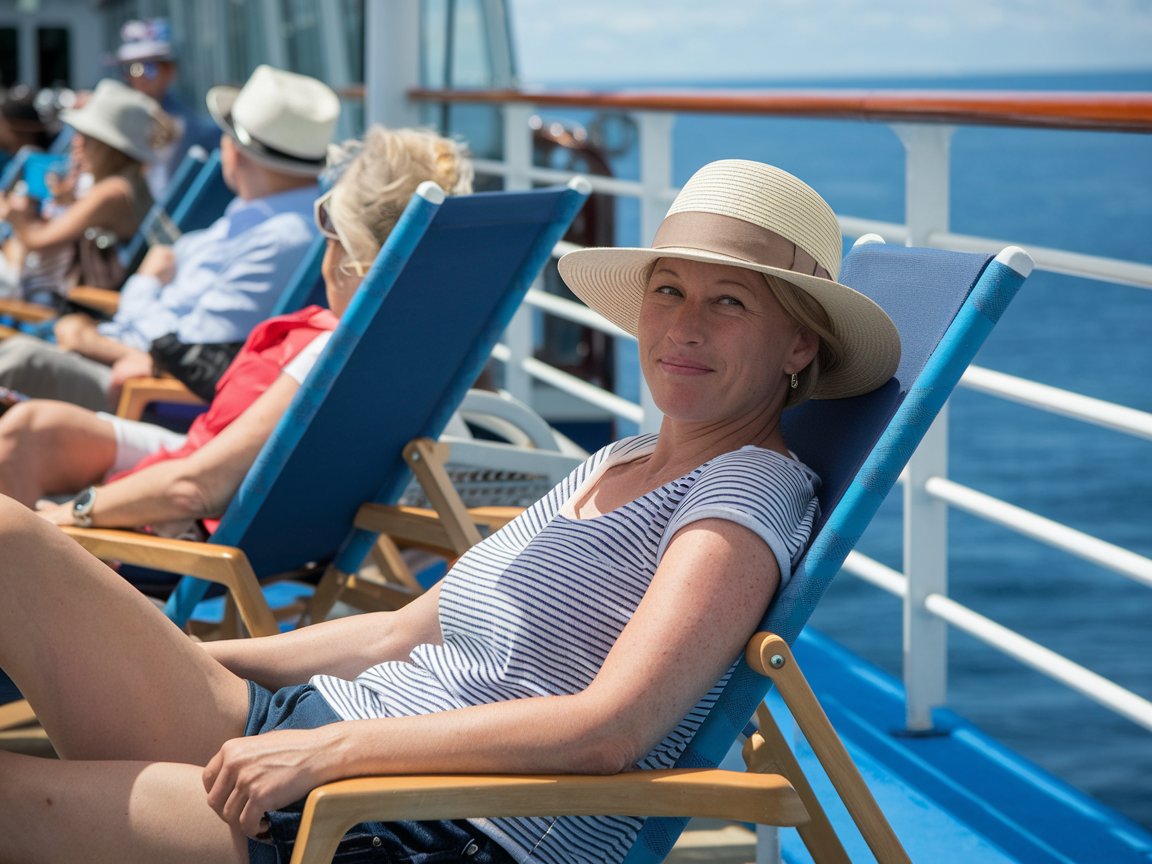
Small Ship Cruises: Green Travel Revolution
Modern small cruise ships lead sustainable travel on the oceans. These vessels use advanced eco-friendly systems to protect marine environments whilst delivering memorable experiences.
Ships now feature:
- Advanced waste management
- Clean fuel systems
- Energy-efficient designs
- Strict environmental controls
Key Benefits:
- You explore Arctic waters in ships that meet top environmental standards
- You join expert guides for nature tours with minimal environmental impact
- Your journey supports local communities and responsible tourism
- You witness green technology in action during your voyage
- Your holiday creates lasting memories whilst protecting the environment
Small cruise ships demonstrate how sustainable tourism works in practice. These vessels combine eco-friendly travel with outstanding natural experiences, making green travel accessible and enjoyable.
Additional Features:
- Smaller passenger numbers reduce environmental impact
- Direct access to remote locations
- Personal connection with local cultures
- Educational programmes about marine conservation
The ships prioritise both passenger comfort and environmental protection, showing that responsible travel needn’t compromise on quality experiences.
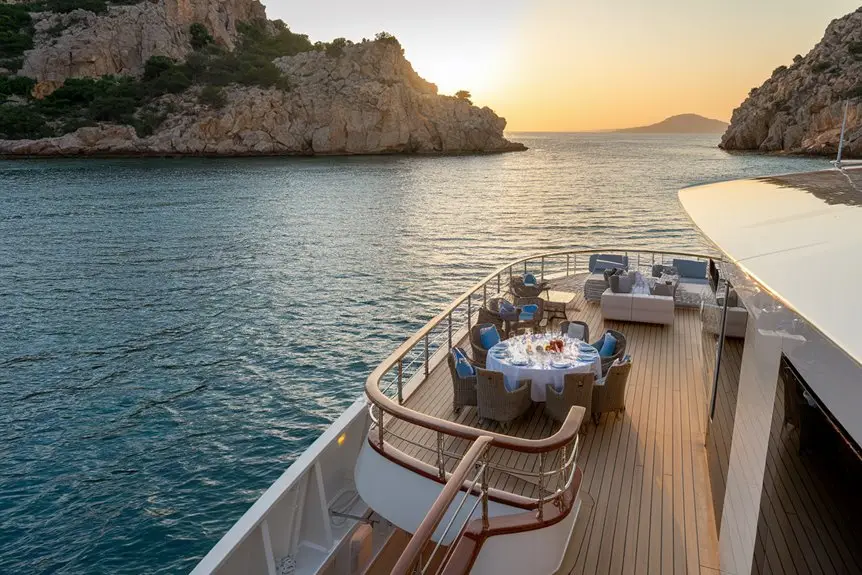
Book Early, Cruise Better
Small ships offer exclusive routes, including themed trips and access to historic rivers that big ships can’t reach. You’ll enjoy more personal space – typically 50% more than larger cruise ships – and better service with more crew members per passenger.
These intimate cruises give you special experiences like cooking with the ship’s chef and exploring local markets with guides.
Each vessel carries fewer passengers, creating a more relaxed atmosphere. The best cabins and most popular routes sell out months in advance.
Small ship cruising is growing fast, with passenger numbers expected to double by 2030.
Smart tip: Book 12-18 months before your planned travel date for the widest choice of cabins and destinations.
Frequently Asked Questions
What Happens if Severe Weather Disrupts a Small Ship’s Planned Route?
Small ships adapt quickly to severe weather situations through established safety procedures.
The crew constantly monitors weather conditions and makes necessary route adjustments in real-time. Your journey may include visits to different ports than originally planned. The captain and crew will keep you informed about all changes to the schedule.
Every small ship maintains detailed contingency plans and employs trained staff to navigate safely around storms. Weather-related changes happen regularly at sea, and ships’ crews manage these situations as a standard part of maritime operations.
Are Special Dietary Requirements More Challenging to Accommodate on Smaller Vessels?
Special dietary needs are trickier to handle on smaller ships due to practical limitations.
Small galleys restrict food preparation space, while compact storage areas hold fewer specialty ingredients. A reduced kitchen team means less flexibility for custom meal preparations.
The limited dining options narrow menu choices for passengers with dietary restrictions. Guests need to notify staff well in advance about their dietary needs to ensure proper meal planning.
Remote sailing routes create additional challenges, as specialised ingredients become harder to source away from major ports.
These constraints require careful planning from both crew and passengers to maintain dietary requirements throughout the journey.
Small ships can still accommodate special diets, but the process needs more coordination than on larger vessels.
How Stable Are Small Ships Compared to Large Cruise Vessels?
Small ships and large cruise vessels handle stability differently at sea.
Small ships generally offer better stability thanks to two key factors: a lower centre of gravity and modern stabilisation systems. These features help them manage rough waters effectively.
Large cruise ships feel stable in calm conditions because of their size. However, they tend to roll more in bad weather. Think of it like comparing a speedboat to a floating hotel – the smaller vessel can quickly change direction to avoid storms.
The compact size of smaller ships gives them an edge in tough conditions. They can:
- Move swiftly to dodge rough patches
- Navigate tight spaces easily
- Respond faster to changing weather
While both vessel types are safe for travel, small ships often handle challenging seas more comfortably than their larger counterparts.
What Medical Facilities and Staff Are Available on Small Expedition Ships?
Medical facilities on small expedition ships operate from the lower deck and include key emergency equipment. Every ship carries defibrillators, cardiac monitors and oxygen supplies. A qualified doctor and nurse remain on call around the clock.
The medical team treats common conditions like seasickness and basic injuries. For serious medical situations, they stabilise patients whilst arranging evacuation to mainland facilities.
The ship’s clinic provides essential care rather than comprehensive hospital services. Medical staff prioritise passenger safety through immediate response and proper assessment.
These compact yet efficient facilities maintain medical readiness throughout the voyage. The location on lower decks helps reduce movement in rough seas, making treatment more comfortable.
Can Families With Young Children Safely Participate in Expedition Cruises?
Young children can safely join expedition cruises with the right preparation. Many cruise companies offer special family options and expert staff for younger guests. These cruises provide kid-focused activities, safety-trained crew members and educational programmes.
Key considerations before booking:
- Check the ship’s age limits
- Look for family-sized cabins
- Research child-specific activities
- Verify safety measures for children
- Confirm medical facilities on board
Most family-friendly expedition cruises include:
- Educational nature activities
- Supervised adventures
- Special menus for children
- Family group excursions
- Child-safe equipment
Parents should assess their children’s readiness for such trips by considering:
- Swimming ability
- Physical fitness
- Comfort with boats
- Interest in nature
- Ability to follow safety rules
Choose cruises that match your children’s age and capabilities to ensure an enjoyable experience for the whole family.
Get honest cruise advice that puts your interests first.
Jo and the About2Cruise team provide expert guidance to help you choose cruises based on reality, not marketing promises. Find out more about us.
